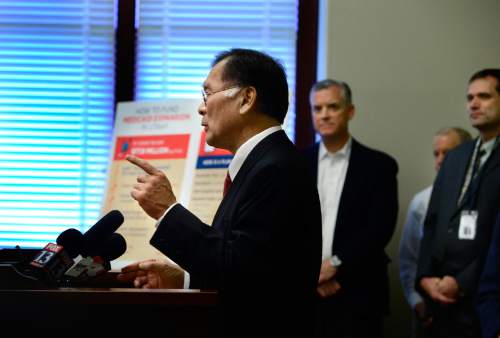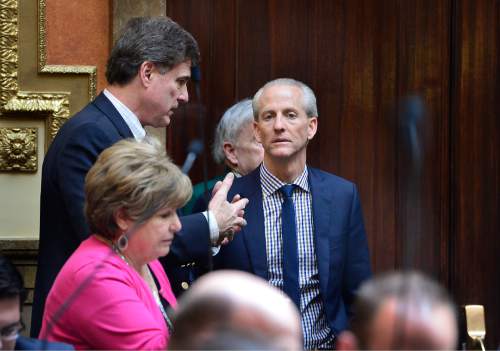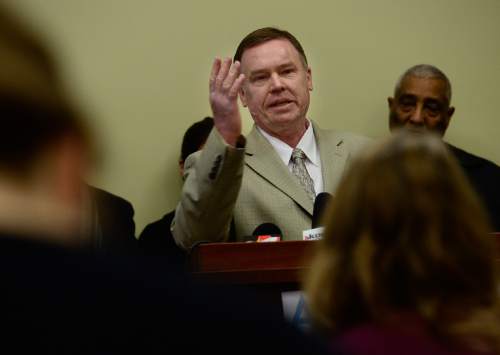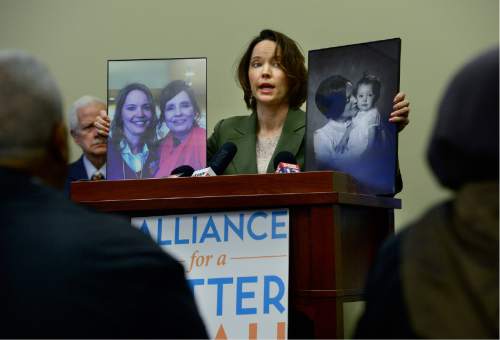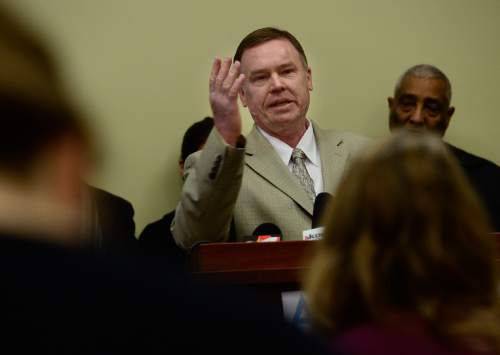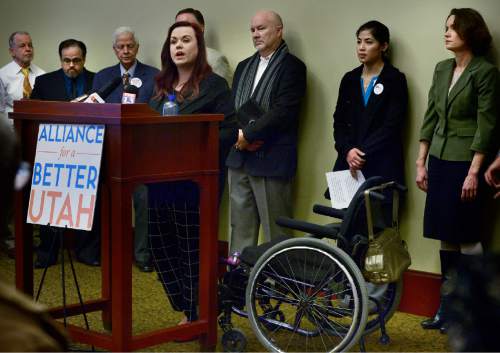This is an archived article that was published on sltrib.com in 2016, and information in the article may be outdated. It is provided only for personal research purposes and may not be reprinted.
Utahns who could have received health care if the Legislature had expanded Medicaid in the past two years again pleaded with lawmakers to take action — although the action they appear most likely to take would cover only the poorest Utahns while leaving tens of thousands without health coverage.
HB437, House Majority Leader Jim Dunnigan's proposal to expand Medicaid, released Wednesday, was aimed at providing coverage to 16,000 of the poorest Utahns who are uninsured.
The bill prioritizes those who are chronically homeless, parolees or those in need of substance-abuse or mental-health treatment. The $100 million price tag — $30 million in state funds and $70 million in federal money — would translate into health benefits for a little more than a third of the 43,000 Utah adults who are uninsured and living below the poverty level.
Stacy Stanford said it is frustrating to see so many people left out. A car accident triggered a degenerative neurological disease that has made it difficult for her to walk, but she did not meet the disability requirements for Medicaid coverage.
"It's very frustrating because the partial expansion, especially where he's looking at limiting it by income, there are so many Utahns [who] are earning nothing that he's having to come up with arbitrary guidelines to limit [enrollment]," she said. "In my mind, the logic says if there are so many people desperately in need that you have to add all these contingencies to keep their numbers low, wouldn't logic dictate that the people in need, you should probably just give them health care."
Dunnigan, R-Taylorsville, has said he hopes his bill lets the state gather data on the cost of covering the uninsured so the state can potentially take steps to cover others in the years to come.
Advocates for Utah's poor recognize the bill is short of Gov. Gary Herbert's Healthy Utah proposal and Utah Access Plus, the plan hammered out between Herbert and legislative leaders. Both of those bills would have cost the state about $78 million — drawing hundreds of millions in federal dollars — and provided subsidized health coverage to about 125,000 individual Utahns annually earning up to $16,243, or 138 percent of the federal poverty level.
But Healthy Utah was defeated soundly in the House last session and Utah Access Plus garnered almost no support in either the House or the Senate. Dunnigan's bill is better than doing nothing, said Bill Tibbitts, associate director of Crossroads Urban Center.
"Providing coverage for 16,000 of those 43,000 people would reduce suffering in our state and possibly save a few lives," Tibbitts said.
Rep. Ray Ward, R-Bountiful, who is a primary-care doctor and is sponsoring a bill nearly identical to last year's Healthy Utah, said in his practice he "watches things go downhill" when patients don't have the health coverage to get the tests they need.
Ward said that it may take some time, but he believes Utah, like other states moving toward expanding Medicaid, will find a way to cover all of those people in the gap — eventually.
"We will get it, a step at a time," Ward said. "I hope we can come away with some progress this session, some step in the right direction."
Karina Brown said it is too late for her mother, who fell into the coverage gap and was unable to get preventative care. She eventually died from a stroke.
"My mother would most likely still be here with us today, had she received the routine medical care that [Medicaid expansion] would provide," Brown said.
Josh Kanter, chairman of the Alliance For a Better Utah, said it has been 785 days since the Legislature could have opted to expand Medicaid, and an estimated 430 people have died in that time because they lacked coverage.
"The question is not, 'Is it the right thing to do?' but, 'How is it possible we have yet to do it?' " Kanter said. "It is time to get something done. It is time to take care of our families, our friends and our neighbors."
Senate President Wayne Niederhauser, R-Sandy, said he had been briefed on the content of Dunnigan's bill and believes "it has a good chance of passing in the Senate."
Dunnigan's bill and several other proposals will likely be heard by a legislative committee next week. One proposal — Democratic Salt Lake City Sen. Gene Davis' bill to fully expand Medicaid to the 125,000 Utahns — was approved Tuesday by a Senate committee and is awaiting debate in that chamber.
Twitter: @RobertGehrke


